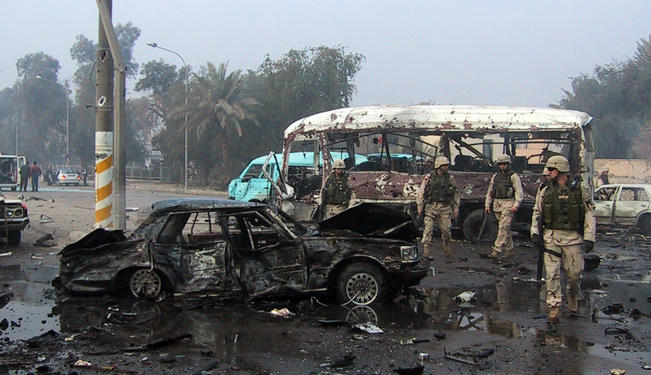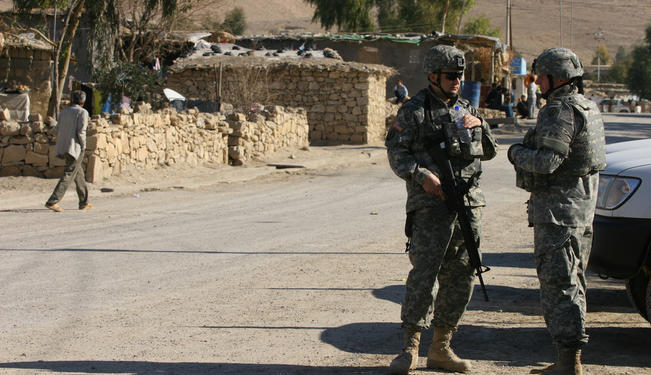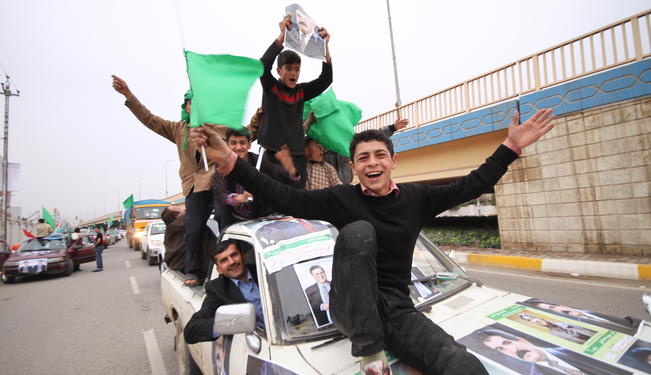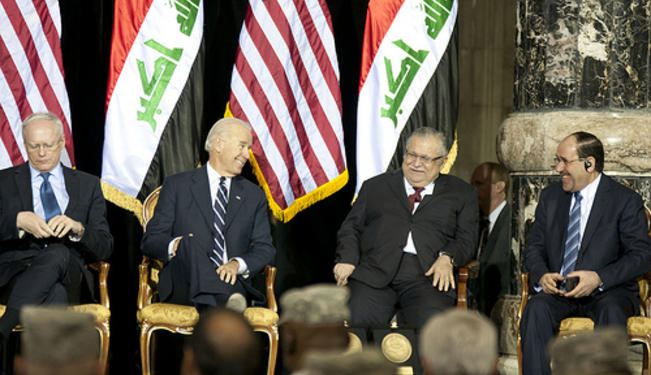As the conflict in Syria gains in intensity, so does the possibility of destabilization in Iraq. The three major sectarian groups in Iraq now have a unique part to play.
Syria has been driving everyone in Iraq mad. In the past week, I visited four embassies in Baghdad and all we talked about was Syria. I went to the United Nations for a meeting on Iraq and all we talked about was Syria. On a recent conference call, every point I made somehow had a connection to Syria. During the conference call one of my Iraqi colleagues sent me an email saying: “The fall of the armies of Syria signals the coming of the 12th Imam”. In short, everyone in Iraq is mad about Syria. Let me explain.
Two Countries, One Outcome
Whatever the outcome is for Syria, the impact on Iraq will be appreciable. Iraq, like Syria is a sectarian environment driven by the self-interest and self-preservation of the various sects, primarily Sunni and Shi’a, along with the Kurdish. In the news coverage of Syria, the unique similarities to Iraq are being overlooked. It is no secret that most commentators and analysts are fatigued when it comes to Iraq. The sectarianism and terrorism is all old news. The day the US military left for Kuwait, Iraq became relatively “uninteresting”, but this is all about to change and Syria is the reason.
Since December 2010, the Iraqi government has been held together through the various machinations of the Shi’a political class. The interjection of the petrodollar has provided a degree of legitimacy and finance, but enduring political solutions have been abandoned. The current governance strategy is rooted in a sectarian realpolitik and most attempts at compromise have been forgone. Entrenchment across factional divisions within the political and security frameworks has become the perpetual status quo.
As a result, terrorist groups have space to operate and the security forces lack the political sponsorship needed to draft effective counter-terrorism policies. Mass casualty attacks have now become a cyclical event, occurring every four to six weeks. In the aftermath of the last terrorist attacks between July 22-23, there was not even a press release from Iraqi Prime Minister Nouri al-Maliki. There are no more assurances he can offer.
Amongst this mix of political gridlock, ineffective security forces, and sectarian division there is now the possibility of radical regime change in Syria. This is a major concern for the Iraqi government and rightfully so. While the commentary on Syria has been succinct and focused, it has not charted the impact on the region as a whole, and more specifically, Iraq.
This is unfortunate for a variety of reasons. Iraq has the second largest oil and gas reserves globally and an antagonistic eastern neighbor with Iran, who is about to lose their strategic depth in the Levant.
If there is radical regime change in Syria (driven by sectarian engines), it could invert the tenuous balance of power in Baghdad. Should this happen, the Iraqi government will be in an untenable position based on a combination of internal and external factors.
The Mare’s Nest: North and Central Iraq
Iraq as a sectarian society can be broken down into three geographical locations. Kurdish in the North, Sunnis in the Center, and Shi’a in the South. Each of these factions now has a unique role to play in how Iraq responds to regime change in Syria.
The Kurdistan Regional Government (KRG) in Northern Iraq, led by Massoud Barzani, has made it a policy to arm, finance, and train Syrian Kurds. This is in direct opposition to the strategy adopted by the Iraqi government, which has been a mixture of neutrality and maintenance of the status quo. An estimated 650 Syrian Kurds have already been trained in the KRG and more are scheduled for training in the coming months. Moreover, at least six Kurdish towns in Syria are now being occupied.
No precaution towards national reconciliation is being established within this policy. The possibility of uniting an autonomous Kurdish region in Syria, at least in the short term, achieves aspirations of a pan-Kurdish alliance, but it will be short lived. The Free Syrian Army has already implicitly stated that it will not recognize Kurdish autonomy, while clashes between the two have been reported. This kind of factious fighting is exactly what Baghdad is desperate to avoid.
In response to this policy, on July 27, the Iraqi Army was deployed to a border crossing with Syria along the contested KRG boundary. The military of the KRG, known as the Peshmerga, halted their advance and until August 3 both sides reinforced their positions only a kilometer apart. The situation appears to have de-escalated, but only after significant mediation by US Vice President Joe Biden. This has now exacerbated internal resentment between the political coalitions and compounded sectarian positions within Iraq even further. The Shi’a coalitions have firmly aligned behind PM Maliki to disrupt what they perceive to be a consolidation of North Iraq (and subsequent oil reserves) by the Kurdish.
This stand-off along the KRG-Syrian border has wasted security resources and manpower from where it is really needed. For the past month there has been a noticeable increase in the rate of terrorism in the central Iraqi provinces. This has coincided with new leadership and strategy from groups such as al-Qaeda in Iraq and the Islamic State of Iraq. Al-Qaeda in Iraq’s new leader, Abu Bakr al-Baghdadi, in a recent audio release, has licensed a campaign targeting both the judiciary and the Iraqi Security Forces, called “Breaking the Walls”. More perturbing was also a call urging Iraqis to start a jihad in Syria. Syria remains the perfect environment for groups like al-Qaeda in Iraq to grow, and is accelerating enthusiasm for their core base inside Iraq.
This is an intolerable scenario for the Iraqi government. If terrorist networks such as al-Qaeda in Iraq are able to establish rear-bases in Syria, they will expedite the tempo of terrorist attacks inside Iraq. This scenario is also supported by a fear of radical regime change in Syria. If regime change is proceeded by the rise of a conservative Sunni government, a new sphere of influence will develop between Syria and the central Sunni provinces in Iraq. This will not only provide leeway for continued terrorism, but renew calls for greater Sunni autonomy within Iraq. This would also be in the strategic interests of Saudi Arabia, who is financing the Sunni opposition in Syria.
The Pressure Cooker: South Iraq
This leaves the southern Shi’a provinces who are the core of the Iraqi political elite, and their relationship to Iran. If a Sunni dominated government comes to power in Syria, Iran will lose their strategic depth in the Levant, but not necessarily their ability to project power. For Iran, the existing relationship with Iraq will provide new depth. This will come through a further integration of cultural and religious institutions, which are tied to the political and economic policies of Iraq. Certain Shi’a groups will try and maintain a level of autonomy, but if a Sunni government comes to power in Syria, the Shi’a political class in Iraq will gravitate towards Iran out of a perceived necessity. This will come at the expense of the central Sunni provinces, who are skeptical, at the best of times, about government connections with Iran. Increased polarization of the different political coalitions can be expected along with a catalyst for continued sectarian violence.
Iran through a clandestine military unit known as the Quds Force, still maintains an impressive network of Shi’a insurgent groups inside Iraq.Groups such as Kata’ib Hezbollah and Asa’ib Ahl al-Haq, battled the US military to a deadlock and their experience in urban and insurgent warfare remains a potent tool. While these groups are currently dormant they can provide a tactical depth, which can be used in Syria.If the Alawite community resorts to insurgency, post-regime, they will receive funding and support from Iran, some of which will come via these groups in Iraq. The recent abduction of close to 50 Shi’a pilgrims in Syria on August 4, could very easily provide the rationale for a wider involvement of these networks.It would not be impolitic to assume they are already there.
Iraq vis-à-vis Syria
Unfortunately, the current scenarios for Iraq are discouraging vis-à-vis Syria. Without international intervention, Syria will continue to slip into deeper sectarianism, which is the worst case scenario for Iraq. The links between al-Qaeda in Iraq and Islamist groups in Syria are becoming well established. The impact of this will further embolden grievances and frustrate the compromise needed to establish effective security mechanisms in Iraq. The policy of the KRG to arm Syrian Kurds remains myopic and divisive for both Syrians and Iraqis. In reality, the best policy has already been adopted by the government of Iraq: remain neutral and maintain the status quo. At a minimum this provides space for strategic leverage and does not overtly antagonize sectarian issues domestically or within Syria.
It is only a matter of time before President Bashar al-Assad and the Syrian regime are relegated to the back pages of history. It might take three, six, or eight months, but the end will come and a measured approach is required. Giving countries like Saudi Arabia and Qatar a free hand in the arming and financing of the Syrian opposition remains nonsensical. Too much has been invested in Iraq to let it destabilize because of a sectarian conflict in Syria that could have been prevented with a bit of calculated foresight. If anything, call in the Iraq experts. They understand better than most what happens when a country divides across ethnic or religious boundaries.
The international community, especially Western countries must pay special attention to developments in Iraq. It has only been six months since the US military left Iraq and the security profile continues to shift from bad to worse. Short-term gains in Syria should not be made at the expense of regional stability, specifically that of Iraq. Look at it another way. When the fighting in Libya was at its zenith, oil shares peaked at a two year high and this accounted for only 3% of the market in a localized conflict. Imagine if Iraq fails to maintain its oil exports due to stability issues, for the country accounts for almost 11% of total oil reserves globally.
The Shi’a believe in a prophecy that the “12th Imam” will return after the destruction of Syria and its armies. In another Shi’a legend, affliction and fear will plague the people of Iraq and herald the return of the Imam. Iraq survived the latter prophecy once, there is no need to tempt fate again with the former.
The views expressed in this article are the author’s own and do not necessarily reflect Fair Observer’s editorial policy.
For more than 10 years, Fair Observer has been free, fair and independent. No billionaire owns us, no advertisers control us. We are a reader-supported nonprofit. Unlike many other publications, we keep our content free for readers regardless of where they live or whether they can afford to pay. We have no paywalls and no ads.
In the post-truth era of fake news, echo chambers and filter bubbles, we publish a plurality of perspectives from around the world. Anyone can publish with us, but everyone goes through a rigorous editorial process. So, you get fact-checked, well-reasoned content instead of noise.
We publish 2,500+ voices from 90+ countries. We also conduct education and training programs
on subjects ranging from digital media and journalism to writing and critical thinking. This
doesn’t come cheap. Servers, editors, trainers and web developers cost
money.
Please consider supporting us on a regular basis as a recurring donor or a
sustaining member.
Support Fair Observer
We rely on your support for our independence, diversity and quality.
Will you support FO’s journalism?
We rely on your support for our independence, diversity and quality.











